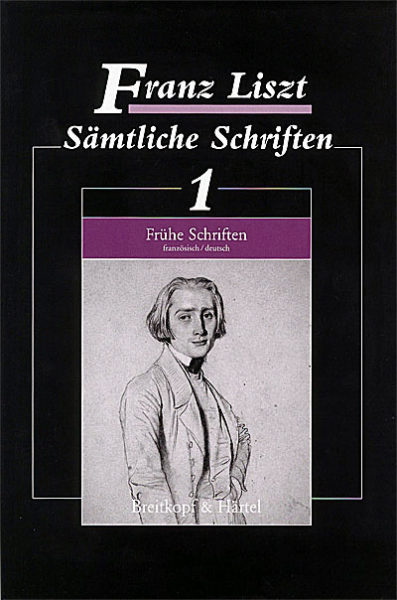Digitale Ausgabe der Schriften von Franz Liszt (DFG-Projekt)

Gegenstand des Projekts ist die digitale Edition der sämtlichen Schriften von Franz Liszt. Übergeordnetes Ziel ist die erstmalige vollständige Bereitstellung und weltweite Erreichbarkeit der Texte einschließlich aller relevanten Materialien und Dokumente als historisch-kritische sowie in offenen Standardformaten erstellte, gut auffindbare, kostenfrei und langfristig verfügbare born digital-Edition. Mit Hilfe einer thematischen Erschließung der Schriften wird erstmals ein über die üblichen Suchoptionen hinausgehender interessengeleiteter und interdisziplinärer Zugriff auf die Texte ermöglicht. Die statische Einteilung einer gedruckten Ausgabe wird aufgegeben zugunsten von weitaus vielfältigeren Möglichkeiten sowohl chronologischer als auch thematischer Anordnung und Selektion, wie sie nur in einer digitalen Edition realisiert werden können. Dies trägt der thematischen Fülle der Liszt-Schriften Rechnung, deren Fokus weit über rein musikalische Fragen - etwa der Programmmusik - hinausgeht: So nimmt Liszt im z.B. im literarischen Format des Reisebriefes zu ästhetischen, kulturellen und sozialen Problemen Stellung; den Werken Richard Wagners widmet er umfangreiche Essays, über Fryderyk Chopins Leben und Schaffen verfasst er nach dessen Tod eine Monographie. Im Kontext seiner Tätigkeit als Weimarer Hofkapellmeister (1848-1858) entwirft er unter dem Titel Die Goethe-Stiftung ein detailliertes Programm zur Förderung aller Kunstsparten. Das umfangreiche Buch über Die Zigeuner und ihre Musik in Ungarn ist getragen von der (heute widerlegten) Überzeugung, der ungarischen Musik liege ein von Sinti und Roma tradiertes Epos in Tönen zugrunde. Die charakteristische Diversität dieser Themen und ihr weiter kultureller Horizont, der philosophische, musikästhetische, sozialkritische und kulturgeschichtliche Fragen verbindet, soll mithilfe eines kontrollierten Schlagwortsystems erschlossen werden. Dieses Konzept erfordert die Entwicklung neuartiger Module, die für die digitale Edition von Musikerschriften im Rahmen des Liszt-Projekts erprobt werden sollen.
The scope of the project is the digital edition of the complete writings of Franz Liszt. The overarching goal is the first complete provision and worldwide accessibility of the texts, including all relevant materials and documents, as a historical-critical born digital edition that is easy to find, available free of charge and in open standard formats. With the help of a thematic annotation of the writings, for the first time an interest-based and interdisciplinary access to the texts beyond the usual search options is made possible. The static classification of a printed edition is abandoned in favor of far more diverse possibilities of chronological as well as thematic arrangement and selection, which can only be realized in a digital edition.
This takes into account the thematic richness of Liszt's writings, whose focus goes far beyond purely musical issues - such as programme music: in the literary format of the Travel Letter, for example, Liszt comments on aesthetic, cultural and social problems; he devotes extensive essays to the works of Richard Wagner, and he writes a monograph on Fryderyk Chopin's life and work after his death. In the context of his activity as a Weimar Court music director (1848-1858), he drafted a detailed programme for the promotion of all artistic disciplines under the title “The Goethe Foundation”. The extensive book on “The Gypsies and their Music in Hungary” is based on the conviction (now disproved) that Hungarian music goes back to an epic in tones handed down by Sinti and Roma.
The characteristic diversity of the topics and their broad cultural horizon, which combines philosophical, music-aesthetic, social-critical and cultural-historical questions, is to be made accessible with the help of a controlled keyword system. This concept requires the development of novel modules that are to be tested for the digital edition of music writings as part of the Liszt project.
Team
Das Projekt wird gemeinsam mit dem Trier Center for Digital Humanities der Universität Trier, dem Musikwissenschaftlichen Seminar der Ruprecht-Karls-Universität Heidelberg und dem Institut für Musikwissenschaft der Universität Regensburg durchgeführt.
Projektleitung Claudia Bamberg (Trier), Thomas Burch (Trier), Rainer Kleinertz (Saarbrücken), Dorothea Redepenning (Heidelberg)
Projektmitarbeit Bettina Berlinghoff-Eichler (Regensburg), Matthias Bremm (Trier), Stephanie Klauk (Saarbrücken), Evelyn Kreb (Saarbrücken), Jule Ritterbusch (Saarbrücken), Charlotte Schmidt (Saarbrücken)
Mehr zum Projekt
Prof. Dr. Rainer Kleinertz im Gespräch mit Jochen Hubmacher zum Thema „Liszt schwarz auf weiß – digitale Ausgabe der Schriften von Franz Liszt geplant“ (Deutschlandfunk, 16. Januar 2023)
